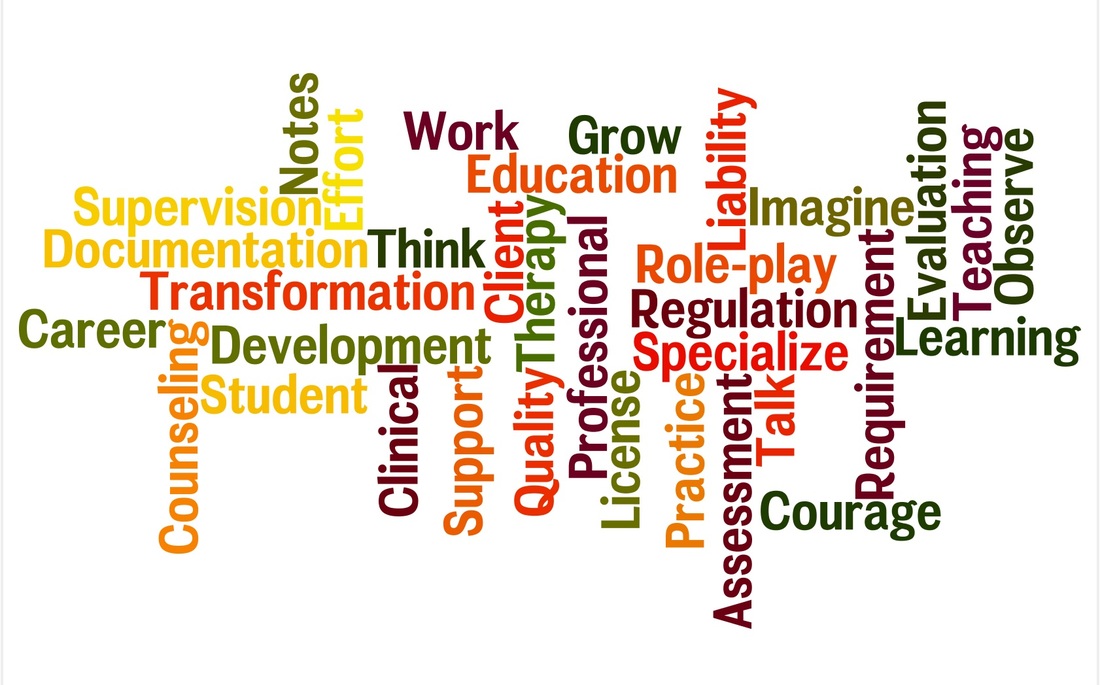Below you will see a sample of past workshops I've offered:
|
"The Nuts and Bolts of Starting a Private Practice"
Laura L. Lansrud-Lopez, M.A., LPCC, LPAT, ATR-BC and
Deborah Heikes, M.A., LPCC This three hour workshop will cover the A-Z "basics" of starting a private practice. Topics to be covered include finding office space, obtaining business licensing, getting credentialed with insurance companies, tax ID numbers, clinical and office forms & documents, ethical considerations in private practice, getting clients, and branding. We will also explore “next steps” toward developing a thriving, successful, and sustainable practice. |
|
"Understanding and Working With Borderline Personality Disorder"
Laura L. Lansrud-López, M.A., LPCC, LPAT, ATR-BC Borderline Personality Disorder (BPD) is a complex, often misunderstood, and highly stigmatized mental health diagnosis. With nine possible symptom sets there are over 200 different ways the disorder may manifest itself. Additionally, BPD frequently co-occurs with major depressive disorder, substance abuse, eating disorders, and anxiety disorders. Despite the complexity of diagnosis, one thing is clear: individuals with BPD suffer from chronic and severe emotional pain. Yet they often experience stigma and discrimination from the very professionals they seek out for help. This two hour presentation is intended to demystify BPD, discuss effective treatments, and look at ways we can compassionately work with clients carrying this diagnosis. |
|
"Ethics and Social Media: Awakening to a New Multicultural Challenge"
Laura L. Lansrud-López, M.A., LPCC, LPAT, ATR-BC, and James Nolan, Ph.D. Do you have a Social Media policy as part of your informed consent process? What if a client sends you a “friend” request or begins to “follow” you on Facebook, Google+, Pinterest, or Twitter? When is it ethical to conduct an internet search on a current or prospective client? How will you respond to negative ratings on consumer sites such as Yelp.com or HealthGrades.com? Have you considered the probability that a client will research you online before or during a course of therapy? Is that a violation of your privacy? Is it a mere boundary crossing? What is an ethical response? These and other interactions with social media are ripe with ethical questions relating to boundaries, transparency, self-disclosure, availability, confidentiality, privacy, and informed consent as well as introducing new gray-zone areas such as “friending,” “following,” “commenting,” and “posting.” Many mental health professionals believe they are invisible when they are off-line, but it is no longer realistic to think our professional identities, reputations, and client relationships are unaffected by social media or advances in technology just because we don’t participate in specific social media platforms. The reality of instantaneous and pervasive online connectivity is headed our way, and information about us is already widely available online with and without our permission. This six hour workshop explores how we can engage this territory without fear and in an informed, conscious, and ethical manner. Additionally, we will equip you with essential information about the emerging and historically significant digital native/digital immigrant cultural divide – a divide, when viewed through a multiculturally sensitive lens, will assist us in ethical decision making regarding our social media presence. |
|
"Best Practices in Clinical Supervision: The Times, They Are-a-Changin’ "
Laura L. Lansrud-López, M.A., LPCC, LPAT, ATR-BC, NCC Increasingly, clinical supervision is being recognized as a separate specialty area in the helping professions, requiring specific awareness, knowledge, and skills. In essence, being a competent supervisor requires more than just being a seasoned or competent clinician or educator. In this era of the Affordable Care Act ("Obamacare"), increased expectations and accountability make the practice of counseling supervision a more demanding clinical activity, with abundant opportunities for professional growth... and greater responsibility. This presentation will be a straightforward review of the best practices and standards of care in art therapy and counseling Supervision. |

"Ethical Issues in Case Documentation"
Laura L. Lansrud-López, M.A., LPCC, LPAT, ATCS, ACS
The Affordable Care Act (“Obamacare”) continues to be the law of the land. Its regulatory requirements impact and shape the way mental health services are delivered in this country, and now more than ever helping professionals are tasked with thoroughly and ethically documenting every aspect of care. In some situations, reimbursement is determined by appropriate documentation of progress, in others, solid clinical documentation could provide a defense in the case of client complaint or litigation. In all situations, it is ethical practice to keep timely and accurate records.
This workshop will cover the standards and best practices in case documentation, with an emphasis on relevant legal and ethical issues. We will explore the “Golden Thread” and focus on practical aspects of theory-based case conceptualization, diagnostic assessment, developing audit ready service plans and progress notes, strategies for evaluating progress, and ethical referrals and termination planning. The ACA Code of Ethics will be used as a guiding resource.
Laura L. Lansrud-López, M.A., LPCC, LPAT, ATCS, ACS
The Affordable Care Act (“Obamacare”) continues to be the law of the land. Its regulatory requirements impact and shape the way mental health services are delivered in this country, and now more than ever helping professionals are tasked with thoroughly and ethically documenting every aspect of care. In some situations, reimbursement is determined by appropriate documentation of progress, in others, solid clinical documentation could provide a defense in the case of client complaint or litigation. In all situations, it is ethical practice to keep timely and accurate records.
This workshop will cover the standards and best practices in case documentation, with an emphasis on relevant legal and ethical issues. We will explore the “Golden Thread” and focus on practical aspects of theory-based case conceptualization, diagnostic assessment, developing audit ready service plans and progress notes, strategies for evaluating progress, and ethical referrals and termination planning. The ACA Code of Ethics will be used as a guiding resource.



